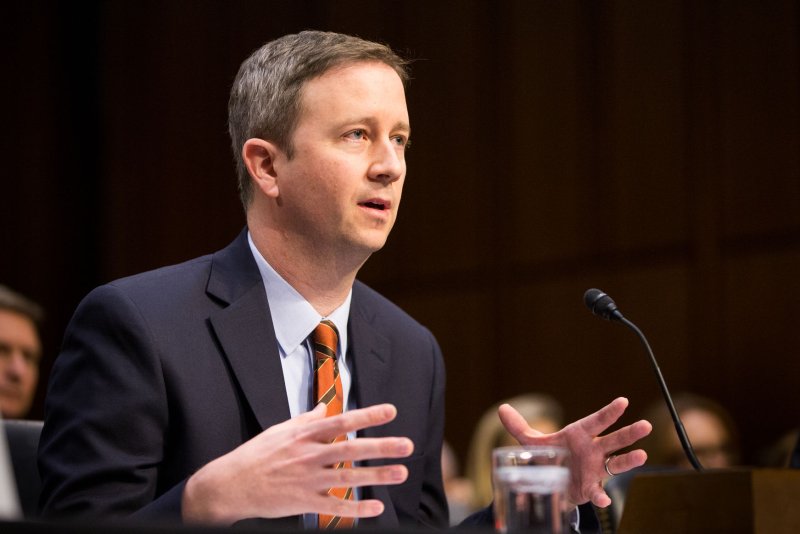1 of 5 | Sean Edgett, general counsel for Twitter, testifies during a Senate Select Committee on Intelligence hearing on Capitol Hill. Photo by Erin Schaff/UPI |
License Photo
Nov. 1 (UPI) -- As part of the upper chamber's Russia investigation, the Senate Judiciary Committee peppered three major U.S. tech companies with questions -- and received promises they will take more responsibility for political content online.
Attorneys from Facebook, Google and Twitter emphasized in testimony Tuesday that only a fraction of their paid political ads came from foreign governments.
The questions posed to the companies stemmed from recent revelations that some politically-oriented ads that ran online last year originated in Russia.
Tuesday's hearing came one day after Facebook said as many as 126 million users may have been exposed to Russian-originated content in the run-up to last year's presidential election. Twitter said it discovered nearly 2,800 Russian accounts, which tweeted 1.4 million times during the campaign -- and Google found 43 hours of Russian-made political content on YouTube.
Sen. Patrick Leahy, D-Vt., said Facebook still has many pages that appear to have been created by the Internet Research Agency, a pro-Kremlin group that bought advertising during the campaign. Sen. Al Franken, D-Minn., said some Russian-backed advertisers even paid for the ads in Russian currency.
"How could you not connect those two dots?" he asked Facebook general council Colin Stretch.
"It's a signal we should have been alert to and, in hindsight, one we missed," Stretch answered.
During the hearing, Sen. Chris Coons, D-Del., showed two examples of Russian-created content -- one about Democratic candidate Hillary Clinton and another that promoted a "Miners for Trump" rally.
Stretch said the ads reflected "the sophistication" of the political strategies.
The committee said the tech companies need to balance freedom of speech with online abuse. Some lawmakers took issue with tech companies' control over free speech.
"The prospect of Silicon Valley companies actively censoring speech or the news content is troubling to anyone who cares about a democratic process with a robust First Amendment," Sen. Ted Cruz, R-Texas, said.
The exchange between the company representatives and senators was often terse.
"You have five million advertisers that change every year, every month, probably every second. You do not have the ability to know about every one of those advertisers, do you?" Sen. John Kennedy, D-La., asked Stretch.
Stretch said advertisers can obscure their identities, causing Kennedy to interrupt with, "Do you have a profile on me?" and ask if Facebook has the personal preferences of panel member Sen. Lindsay Graham.
The Facebook attorney said the social media giant has protocols in place to prevent invasions of privacy.
"The answer is absolutely not. We have designed our system to avoid exactly that."
In later testimony, Google attorney Richard Salgado said his company's platform is not a newspaper, which has legal responsibilities different from technology platforms.
"We are not a newspaper. We are a platform that shares information," he said. "This is a platform from which news can be read from many sources."
Left unanswered was whether Twitter, Google or Facebook have evidence that could confirm allegations that Russians colluded with President Donald Trump's presidential campaign. The role Russia played in the campaign is presently the focus of a Justice Department investigation by special counsel Robert Mueller.
Chairman Sen. Chuck Grassley, R-Iowa, said his staff's review indicates that Russian agents were not attempting to influence the vote.
"Russia does not have loyalty to a political party in the united States," Grassley said. "The goal is to discredit our democracy and divide us."
After the morning and afternoon sessions, Google counsel Kent Walker said in a statement that his company is "committed to finding a way to stop this type of abuse" and will begin "several new initiatives to provide more transparency and enhance security."
Testimony will continue Wednesday before the House and Senate intelligence committees, which are conducting parallel Russia investigations.















